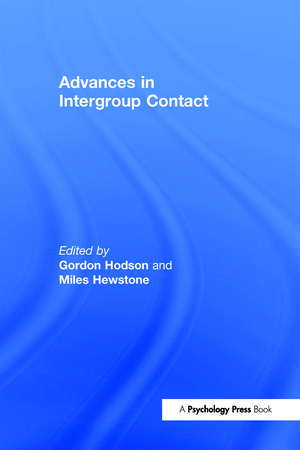Advances in Intergroup Contact
Editat de Gordon Hodson, Miles Hewstoneen Limba Engleză Hardback – 18 sep 2012
This new volume focuses on one of the hottest topics in the social sciences: prejudice. Covering not only basic principles but cutting-edge findings and theoretical directions, key questions surrounding this subject are addressed, such as:
- how perceptions of other groups lead to anxiety and avoidance;
- how cross-group contact influences the development of prejudice in children;
- whether highly-prejudiced people benefit from contact;
- how status and power influence the effectiveness of contact.
This volume draws together world-renowned experts in prejudice and intergroup contact to provide a long-awaited update on the state of affairs in intergroup contact research. As well as synthesizing and integrating the key topics, it also provides possible new directions for future research. Given the prominence of contact as a powerful prejudice-reduction tool, this book is a must-read for students and scholars of social psychology and sociology, as well as policy-makers and practitioners.
Preț: 850.99 lei
Preț vechi: 1142.40 lei
-26% Nou
Puncte Express: 1276
Preț estimativ în valută:
162.84€ • 177.43$ • 137.21£
162.84€ • 177.43$ • 137.21£
Carte tipărită la comandă
Livrare economică 23 aprilie-07 mai
Preluare comenzi: 021 569.72.76
Specificații
ISBN-13: 9781848720541
ISBN-10: 1848720548
Pagini: 330
Ilustrații: 24
Dimensiuni: 156 x 234 x 23 mm
Greutate: 0.64 kg
Ediția:New.
Editura: Taylor & Francis
Colecția Psychology Press
Locul publicării:Oxford, United Kingdom
ISBN-10: 1848720548
Pagini: 330
Ilustrații: 24
Dimensiuni: 156 x 234 x 23 mm
Greutate: 0.64 kg
Ediția:New.
Editura: Taylor & Francis
Colecția Psychology Press
Locul publicării:Oxford, United Kingdom
Notă biografică
Gordon Hodson is Professor of Psychology at Brock University (Canada), where he is Director of the Brock Lab of Intergroup Relations (BLIP). He is currently an Associate Editor at the Journal of Experimental Social Psychology. His research interests involve prejudice and discrimination, with an emphasis on individual differences (e.g. ideology), emotions (e.g. disgust, empathy), and intergroup contact.
Miles Hewstone is Professor of Social Psychology and a Fellow of New College, Oxford University (UK). He has written two books and edited over twenty volumes, publishing on attribution theory, social cognition, stereotyping, and intergroup relations. He is the recipient of numerous awards, and has been elected to the British Academy (National Academy for Arts and Social Sciences).
Miles Hewstone is Professor of Social Psychology and a Fellow of New College, Oxford University (UK). He has written two books and edited over twenty volumes, publishing on attribution theory, social cognition, stereotyping, and intergroup relations. He is the recipient of numerous awards, and has been elected to the British Academy (National Academy for Arts and Social Sciences).
Recenzii
"This extremely valuable document is required reading for advanced scholars and social policy analysts...Summing Up: Highly recommended."- D. Sydiaha, emeritus, University of Saskatchewan, for CHOICE, June 2013
Cuprins
Part 1: Introduction. G. Hodson, M. Hewstone, Introduction: Advances in Intergroup Contact. Part 2: Potential Obstacles to Positive Intergroup Contact and Directions for Circumvention. J. D. Vorauer, Getting Past the Self: Understanding and Removing Evaluative Concerns as an Obstacle to Positive Intergroup Contact Effects. G. Hodson, K. Costello, & C. C. Macinnis, Is Intergroup Contact Beneficial Among Intolerant People? Exploring Individual Differences in the Benefits of Contact on Attitudes. S. Lolliot, K. Schmid, M. Hewstone, A. Al Ramiah, N. Tausch, H. Swart, Generalized Effects Of Intergroup Contact: The Secondary Transfer Effect. T. Saguy, L. R. Tropp, D. Hawi, The Role of Group Power in Intergroup Contact. Part 3: Building Intimacy in Intergroup Contact: Preludes and Processes. R. J. Crisp, R. N. Turner, Imagined Intergroup Contact: Refinements, Debates and Clarifications. T. V. West, J. F. Dovidio, Intergroup Contact across Time: Beyond Initial Contact. F. E. Aboud, C. S. Brown, Positive and Negative Intergroup Contact among Children and its Effect on Attitudes. K. Davies, S. C. Wright, A. Aron, J. Comeau, Intergroup Contact through Friendship: Intimacy and Norms. Part 4: Methodological Concerns and Future Considerations. O. Christ, U. Wagner, Methodological Issues in the Study of Intergroup Contact: Towards A New Wave of Research. G. Hodson, M. Hewstone, H. Swart, Advances in Intergroup Contact: Epilogue and Future Directions.
Descriere
This volume draws together world-renowned experts to provide a long-awaited update on the state of affairs in intergroup contact research.
